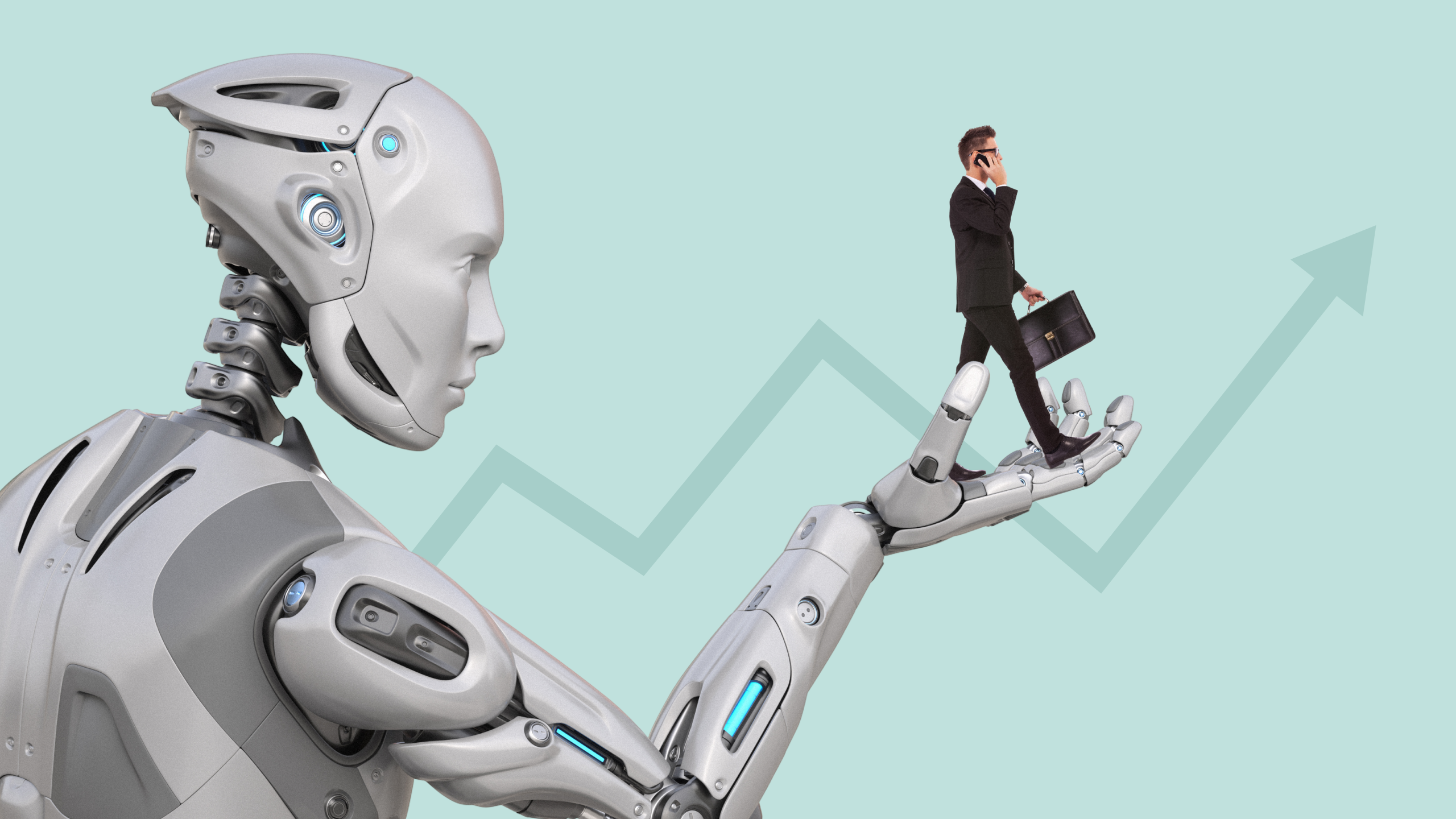Advisors Love Automated Assistants. But What’s the Future of AI?
Expert opinions on artificial intelligence vary, but one thing is certain: Change is inevitable.

Sign up for market insights, wealth management practice essentials and industry updates.
Taking notes and sending automated client emails is great, but financial advisors may have no idea how impactful artificial intelligence will actually become.
Advisors generally agree that there will be subtle shifts that improve efficiency, but some industry analysts are calling for AI to radically redefine what it means to be a financial advisor. The first phase of integration into financial advising is well underway. The technology is already functioning primarily as a tool for offloading tasks and maybe even jobs, improving workflows, and giving advisors more time to focus on client relationships, prospecting and strategy. But just how much the technology will actually upend wealth management is still hotly debated.
“We are already seeing AI used to find new prospects,” said Joel Bruckenstein, president of Technology Tools for Today. “AI will help advisors make better investment decisions and monitor those portfolios automatically for opportunities,” he said, adding that the technology will act as an “entry-level security analyst” and reduce the number of back-office employees.
Early Innings
For Scott Smith, senior director at Cerulli Associates, AI has three major implementation routes: outsourcing rote tasks, improving performance of current duties, and creating new and different work products. “AI is well-positioned to help improve FAs’ execution and efficiency with the ability to offload and elevate,” he said. “Everything is on the table for disruption.”
Advisors are already embracing AI-powered client service offerings, like note-takers, prospecting tools and portfolio monitors. Even client education is evolving, as AI supports scalable, personalized learning. “AI will help advisors customize their advisor workstations to their needs … Some client education will be done by AI, although I do think the person-to-person relationship will remain important,” Bruckenstein said.
Back to the Future. As AI grows more intelligent and autonomous, the line between tool and team member may begin to blur. At this next stage of development, advisors must reconsider where they add value beyond efficiency. “We’re a lot closer than people think to AI knowing your clients better than you do, and making decisions on their behalf before they even pick up the phone,” said Dan Garrett, managing director at Oyster Consulting. “The real threat isn’t that AI makes advisors more efficient, it’s that it makes entire parts of what advisors do irrelevant.”
In this phase, the advisor evolves into a strategic guide — a person who interprets life events, emotional responses and shifting values through a human lens AI can’t yet fully replicate. “The firms that make it through this wave will be the ones who rethink the advisor’s role completely, moving from financial planner to strategic guide, someone who understands not just the numbers, but the person. Everyone else? They’ll be left competing with apps that never sleep,” Garrett said.
For David Bellaire, executive vice president at the Financial Services Institute, AI will shift client expectations. “Real-time insights, predictive planning, and 24/7 personalized support will become the norm,” he said. “Advisors who can combine AI with empathy, trust, and sound judgment will stand out in a crowded marketplace.”
AI may even fundamentally “rewire the profession,” said Jennifer Magarelli, chief administrative officer at the fintech Bonsai. “The shift won’t be about doing the same tasks faster; it will redefine what human advisors actually do. AI will deliver hyper-personalized planning and predictive insights that anticipate client needs before they’re even voiced. Advisors who don’t evolve into empathetic strategists and life coaches will be left behind.” At this stage, it is clear advisors need to heavily lean on elements of what it means to be human in order to still be relevant.
Bionic Advisor. The third phase is a fusion of human insight with machine intelligence — what some are calling the “bionic advisor.” Here, AI handles not just data analysis but also anticipates life changes, flags blind spots and delivers hyper-personalized advice at scale. “AI can automate those tasks so that everyone is ‘reaching up’, learning new skills. Truly engaged in their job and how to best serve clients,” said Laura Holt, CEO of LHE WealthTech Matchmaker. “We all have blind spots that AI can show us, moving our industry from reactive planning to proactive planning.”
At this level, AI is no longer a tool—it becomes an extension of the advisory team, capable of scaling deeply personal financial advice to a broader audience. “AI is the way to ensure all individuals and families receive personalized advice with the help of both AI and a professional financial advisor — a bionic financial advisor,” Holt said. This fusion also allows advisors to serve new segments profitably, despite shrinking margins and increasing regulatory complexity.
Let’s Slow Down
Not all experts are convinced this transformation will be as swift or dramatic. Cautioning against the hype, Michael Kitces, Chief Financial Planning Nerd at Nerd’s Eye View, urges perspective.
“Yes, AI will be valuable and have impact. No, the business isn’t going to fundamentally change in what we do for clients,” Kitces said. He points out that despite the massive level of technology evolution, like robo, smart phones and the internet itself, the core business did not actually change all that much. “Our research found that adoption is primarily happening with particular segments of advisors … not as a general panacea,” he added.
In other words, meaningful change may come — not in one sweeping revolution — but through a hundred thousand quiet improvements. Cerulli’s Smith added: “Neither advisors or clients over 50 are desperate for change and with them in control of the bulk of investor assets, adoption will likely be on their terms.”
Digital Avatars. If there is one big variable in this transformation, it is empathetic AI. Advisors have long seen themselves as coaches and confidants — but what happens when AI can listen, respond, and even emote to the point it truly feels like computers have emotions? “We’re transitioning from an era where computers assist people to one where people assist computers,” said Darren Tedesco, president of Advisor360°. “Empathetic AI is advancing rapidly … These digital agents may even prove more empathetic than humans themselves.”
Combined with visual technologies, AI avatars could provide always-on, emotionally intelligent advice, challenging even the most human part of the advisor role. “The age of truly empathetic, AI-powered advice is coming faster than most people expect — and it’s going to redefine what it means to be an advisor,” Tedesco said.
Daniel Yoo, CEO of FinMate AI, offers a sobering thought: “In a world of hyper-optimization, the slower-paced white glove nature of human-to-human interaction may be the only thing left standing for small advisors to provide to the market.”
Everything On the Chain. AI’s most disruptive potential lies not in how advisors operate, but in how the financial system itself is constructed. As decentralized, autonomous technologies take root, the very notion of money, value, and wealth management is being rewritten.
“The financial system as we know it is on the brink of extinction,” said Thomas Frey, senior futurist at FuturistSpeaker.com. “We’re entering an era of context-aware currencies — tokens that carry embedded governance rights, revenue shares, and access privileges in a single programmable unit. Your reputation, built through on-chain activity, becomes collateral for loans, bypassing credit bureaus entirely. Assets grow smarter too, automatically adjusting risk parameters during market turbulence or freezing during suspicious activity.”
This vision goes beyond robo-advisors and suggests a future where financial planning is embedded in intelligent, self-governing systems, and value creation happens at the speed of thought. “What emerges isn’t just an alternative financial system, but an entirely new economic operating system,” Frey said. He believes it is not a question of whether this future will arrive, but whether you will benefit from it or become obsolete.
Instead of tax and estate planning, advisors could become navigators of a decentralized financial world, helping clients manage not just money, but digital identities, smart assets and programmable economies.
Read the Warning Label. AI is not just a tool. Yes, it will replace jobs … and … (wait for it …) artificial intelligence has a real potential to even replace entire professions. Believe it or not, it’s a warning to advisors to know that rapid changes are coming. Those that ride the wave of change can prosper from it. Those that don’t, might get crushed by it.
Mike Byrnes is a national speaker and owner of Byrnes Consulting, LLC.











